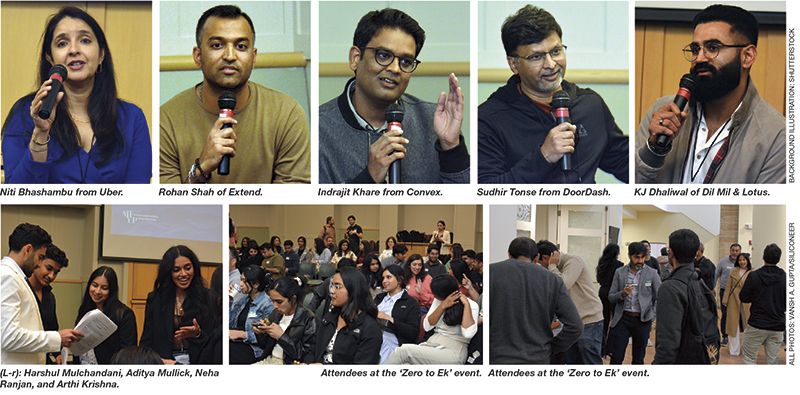Silicon Valley ‘Raees’ – The Gen-Z Indian American Dream
Whether it is willing to be able to “sell ice to Eskimos,” or the importance of having “stupid confidence,” the growing entrepreneurial force amongst the “new” South Asian builders of Silicon Valley is a testament to the changing dreams and ambitions of the South Asian Gen-Z. Hosted in San Francisco, Vansh A. Gupta reflects on the evolving narrative of South Asian ambitions.
![]() We often hear the struggles of our parents. They came to the “land of opportunity” in hopes of a better life. “We left everything back home and came to the US with $100 in our pocket. We lived on pennies, rode the bus, and scoured for deals on meals.” Our parents came with many dreams and aspirations. The biggest was the promise of a better life in America – sustainable living and growth opportunities for their kids.
We often hear the struggles of our parents. They came to the “land of opportunity” in hopes of a better life. “We left everything back home and came to the US with $100 in our pocket. We lived on pennies, rode the bus, and scoured for deals on meals.” Our parents came with many dreams and aspirations. The biggest was the promise of a better life in America – sustainable living and growth opportunities for their kids.
Today, the narrative has evolved for our generation. Today’s South Asians are fortunate with strong representation in the mainstream. We find meaning in alternative paths to success. For Gen-Z, the promise of making just a decent living and following the path of our parents doesn’t fulfill our why.
Whether it is the US Census Bureau or Pew Research Center, Indian Americans have excelled in America showcasing the highest median household income in America. Yes, our parents and peers are doing pretty well. However, when we look for influential figures, very few at the top emerge. Yes, we do have the likes of Sundar Pichai and Satya Nadella, but they aren’t seen as influential figures, yet. Why not? Where is our Steve Jobs? Our Bill Gates?
The Gen-Z South Asian dream is to think and achieve beyond “good enough.” We strive to leave a mark on the world. Whether it is science, medicine, finance, or our favorites – business and technology, we strive to be different and be noticed. We believe that the sky is the limit for us.
This strong sentiment was made evident by the American India Foundation Bay Area Young Professionals’ (AIF BAYP) recent event: ‘Zero to Ek’. Hosted by a group of Gen-Z South Asian tech professionals, ‘Zero to Ek’ spurred an entrepreneurial dialogue with Indian American founders and VCs. The event was organized by AIF BAYP team Harshul Mulchandani, Aditya Mullick, Rachna Gandhi, Neha Ranjan, and Arthi Krishna.
Starting the dialogue, KJ Dhaliwal, emphasized the importance of starting a company with a strong “why.” His sister’s struggle with finding a suitable life partner led to the founding of Dil Mil — a South Asian dating app. Not only did the app help find KJ’s sister a life partner, the app went on to match over 20 million more people. Recently, KJ has shifted his focus towards another purpose. His family’s struggle to access quality healthcare resulted in his latest venture: Lotus Health AI.
KJ discussed the struggles of being raised in a Punjab village. KJ says that the experience in Punjab instilled resilience and philanthropic values within him. He asserts the importance of understanding “what’s your why.” Instead of focusing on the glamour, focus on purpose. He ends the talk by urging us to “work on world problems” and alluding to Steve Jobs: “Stay Hungry. Stay foolish.”

Following Dhaliwal was panelist Niti Bashambu. Having a unique set of challenges in her career, Niti provided an empowering account of her experiences and struggles while navigating life in the Valley. After having her first child, Niti highlighted the balancing act of societal pressures. Between being the stereotypical definition of the perfect mom and following her professional ambitions, Niti revealed that her mother was the reason she excelled in both fields.
According to Niti, a “personal board of directors” is vital for growth. For Niti, it was her mother. Niti was the first woman in their lineage with the opportunity to pursue a career beyond being a housewife. She has led an inspiring career – being the Chief Analytics Officer at IAC, a Growth Council Advisor at Y Combinator. Niti is now the Global Head of Driver Product and Growth at Uber. Niti left the audience with one simple takeaway – the same tip she shared with her son, entering university:
“Be interesting and be interested.”
Following Niti, was panelist Indarjit “Indy” Khare. Indy shares the importance of finding joy in things and then optimizing life towards that joy. For Indy, that joy was learning. With a drive to continuously learn, Indy took Google Photos from 0 to 1 billion users. Now, he is the Head of Engineering at Convex. Indy says that passion is important however it is equally important to take breaks and reflect.
“Find and take the time to understand yourself and what brings you joy. Work towards it.”
Panelist Rohan Shah found inspiration differently. He says that it took a special amount of “stupid confidence” to be able to start a company at a young age and think it would work out. Rohan is the Founder and CRO of Extend. Rohan highlights the importance of understanding one’s strengths and weaknesses. His biggest strength? Being able to “sell ice to an Eskimo.” Being integral in many ventures, Rohan focuses on capitalizing on personal strengths and then hiring to fill the knowledge/skills gaps.
“None of [the money] keeps you happy. It’s the people you work with that keep you happy.”
Panelist Sudhir Tonse introduced himself as the “representative of the uncles.” A very bold statement in a room full of Gen-Z professionals. Sudhir shares his experience at Netflix. He led the evolution from DVD’s to a streaming-based company. Moving up the ‘corporate ladder’, Sudhir went from an engineering role to a managerial role. A growth step for many in the Valley, he reflected on the challenges of being a good leader. His biggest focus is on being just and reasonable as Senior Director of Engineering at DoorDash. Sudhir carried a very optimistic tone towards the future of tech. Having a strong interest in the development of AI, he is most excited about the impact of AI on gene therapy – a stepping stone towards helping those with chronic disabilities.
“You all are brainy folks here. In terms of impact, I ask you to look into AI to see how we can better the world.”
A successful event for AIF BAYP, the ‘Zero to Ek’ dialogue strived for ‘Indian excellence’ educating future ‘South Asian excellence.’ The pursuit of the South Asian Gen-Z dream is alive and well. Whether it is finding your inspiration, solving real problems, choosing your board of directors, or promoting philanthropy; this new dream is very robust. One that builds on the foundation built from our parents’ hard work. Now it is our turn to become the new Silicon Valley ‘Raees’!
All proceeds went towards the Maternal And Newborn Survival Initiative (MANSI).


